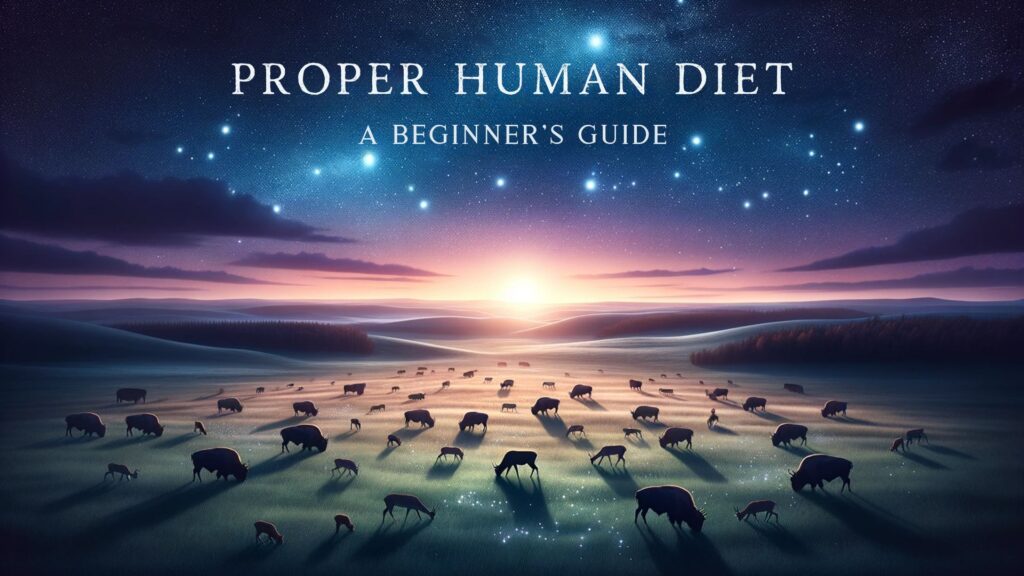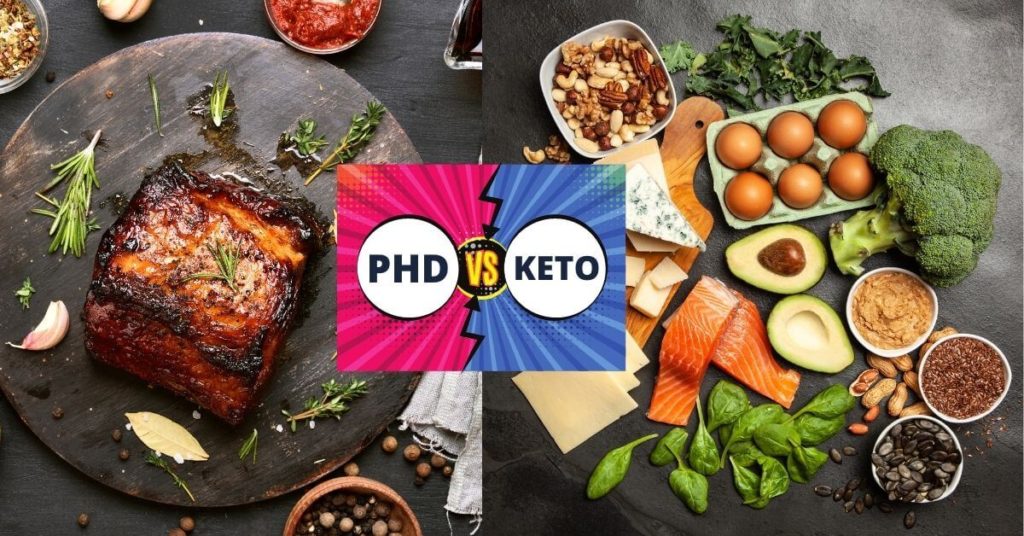Explore the Proper Human Diet—a low-carb, meat-focused approach to eating based on our ancestral roots. Discover its benefits, dietary guidelines, and meal plan for optimal health.
What is the Proper Human Diet?
The Proper Human Diet (PHD) is an approach to low-carb eating formulated by Dr. Ken Berry, known for his support of keto-carnivore diets. This dietary plan has specific characteristics:
- Focus on high-quality meats and animal fats.
- Elimination of grains, sugars, and processed foods.
- Limited inclusion of low-carb vegetables.
Background of the PHD
Developed by Dr. Ken Berry, the PHD is based on his personal experimentation, observations from his family medicine practice, and research into ancestral eating patterns. The diet reflects an attempt to replicate the nutrient-rich diets of early humans, adapted for modern health needs.
Core Principles of the Diet
- High-Quality Meats and Animal Fats: These are central to the diet, emphasizing protein and fat over carbohydrates.
- Elimination of Certain Foods: Grains, sugars, and processed foods are excluded to reduce potential health risks associated with these items.
- Inclusion of Low-Carb Vegetables: While focusing on animal-based foods, the diet allows for a select range of vegetables.
Potential Benefits
The potential benefits of the PHD will be discussed, exploring its impact on health aspects such as weight management and metabolic health.
Discover the PHD: A Return to Our Roots
Introducing the Proper Human Diet (PHD) — a dietary approach that returns to our ancestral roots. It’s not just another fad; it’s a modern take on the very first diet known to humankind.
Championed by the renowned Dr. Berry in 2017, the diet has garnered significant attention. What are its primary recommendations? Embrace a low-carb, meat-centric diet.
If you picture our forebears thriving on quality, grass-fed meats, you’re on the right track. The PHD proposes that by trimming down our carbohydrate consumption and eliminating inflammatory ingredients, we can potentially sidestep the health pitfalls associated with the typical Western diet.
While this diet premise may resonate with many, it isn’t without its critics. It’s a topic of vibrant debate in the world of nutrition. In this article, we’ll dive deep into the facts and insights about the proper human diet, equipping you with the knowledge to decide if it’s the right choice for you.
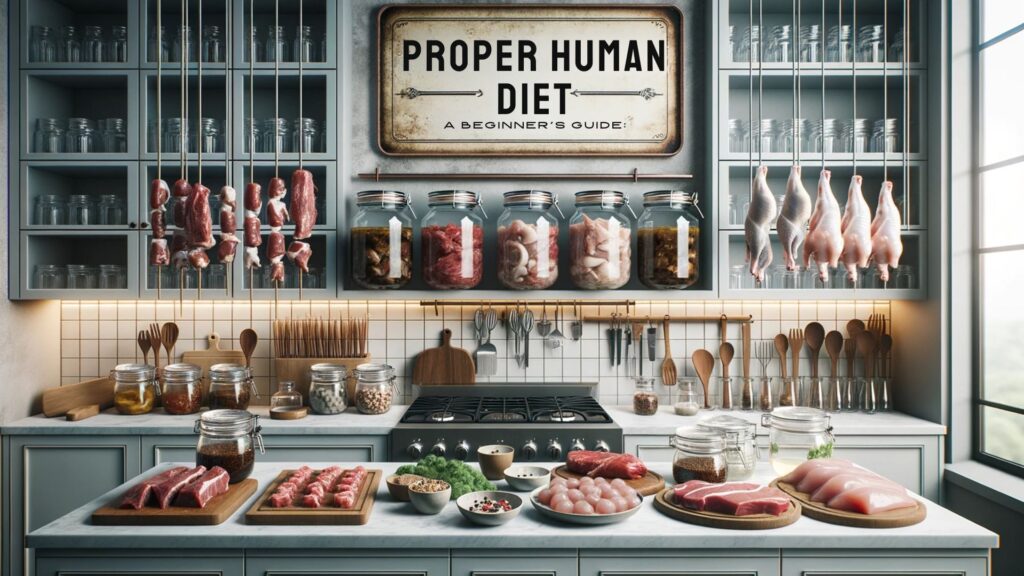
Understanding the Proper Human Diet
The Proper Human Diet, or PHD, is easy. You essentially eat animal foods and products. Everything else is quite restricted.
This means no vegetables, fruits, rice, pasta, potatoes, bread, or grains, and limiting your dairy intake. It’s almost the total opposite of a vegan diet.
While this may seem absurd at first, some people theorize that plant foods are not required to live. Carbohydrates, which are abundant in plants, are the only non-essential macronutrients.
This means that fats and proteins are necessary for our bodies to survive, but we don’t need carbohydrates in the same way. A PHD is nutrient-dense, bioavailable, and satiating (healthy fat and healthy protein).
The Proper Human Diet is an evolution of paleo and keto diets. It stems from the challenged belief that our ancestors ate mostly meat and fish. PHD is ancestral.
A PHD optimizes health and improves health markers (A1c, c-peptide, fasting insulin, triglycerides, HDL-C, inflammatory markers, etc.).
A proper human diet improves/reverses CD (chronic diseases like type 2 diabetes, HTN, obesity, PCOS, etc).

What is the Proper Human Diet? (Video)
A PHD follows a low-carbohydrate diet, ranging from 0 to 100 grams of carbs daily. This spectrum includes Low-Carb, Keto, Ketovore, Carnivore, and Lion diets.
Are you interested in the keto diet and how it works? You can find a guide to the ketogenic diet covering everything you need to know to get started, including benefits, meal plans, and more. Explore “The Ultimate Guide to the Ketogenic Diet” and take the first step towards a healthier lifestyle.
High-carb diets are why Americans and other Western societies experience high rates of chronic inflammation, diabetes, gout, mental disease, autoimmune disorders, heart problems, high blood pressure, and many more health issues.
Bottom line: The Proper Human Diet is a controversial evolution of the keto and paleo diet that aims to eliminate carbs from your diet by eating mainly animal-based foods.
This post contains affiliate links. As an Amazon Associate, I earn from qualifying purchases that help keep this content free. (Full disclosure).
What are the benefits?
Decreased inflammation
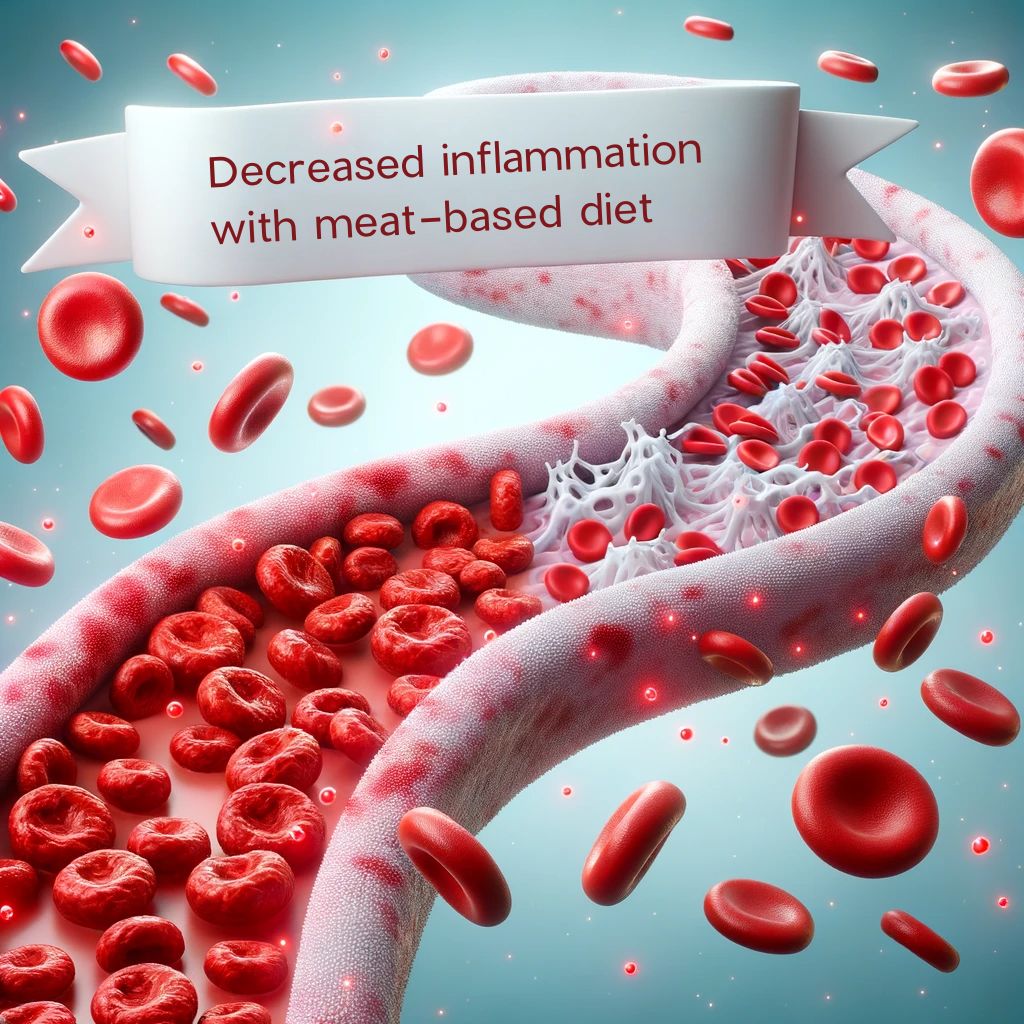
A PHD is Uninflammatory diet.
Consuming carbohydrate-rich foods can intensify inflammation. Processed foods, vegetable oils, and even some plant nutrients have been linked to increased inflammatory responses in the body.
So, having less inflammation through a proper human diet may result in fewer aches and pains. The extra collagen from protein sources can also enhance cartilage health.
Weight loss
Like the keto diet, consuming a meat-based diet can help you lose weight faster because you’re shifting your primary energy source from carbs to fats.
When you’re fat-adapted in ketosis, your metabolism can use dietary and stored body fat for fuel. It means you can burn off your body fat and use it as energy.
Furthermore, fat and protein are very satiating. You can go for many hours without thinking about food, and studies have also shown that becoming fat-adapted changes your hunger hormones, further regulating your appetite.

Mental clarity
Many carnivores, or meat-eaters, have reported increased energy, focus, and mental clarity. This is likely due to limiting carbohydrates, becoming fat-adapted, and running on fat (ketones) for energy.
Besides, studies have shown that ketones have neuroprotective properties, and the brain actually favors fats for energy over carbohydrates.
Increased testosterone
Good fats are responsible for optimal hormonal function, including testosterone. So, diets high in good fats have been shown to increase testosterone levels.
Considering most people will be eating more healthy fats and protein on the Proper Human Diet. But if you’re a woman, don’t despair.
You will see an increase in muscle mass, strength, and energy. The increased fat will regulate your normal hormones, including testosterone. It won’t increase it.
What advocates for the proper human diet propose

Believers in the Proper Human Diet have said it has been the path to an improved mind, fat loss, and relief from chronic illness.
Many people say they have reduced symptoms of mental disorders, diabetes, digestive issues, depression, skin- conditions, joint pain, Lyme disease, hormonal imbalances, chronic fatigue, candida issues, pain, and inflammation.
The Proper Human Diet has been rising fast in popularity in the past two years. Its simplicity is partly its success.
And it does all of this without measuring your food intake, counting calories, and counting your macros. Because all you have to do is eat mainly meat.
What foods are permissible to eat?
Eating mainly animal products makes your weekly grocery trip extremely easy. One of the main selling points of the Proper Human Diet is how easy it is to follow.
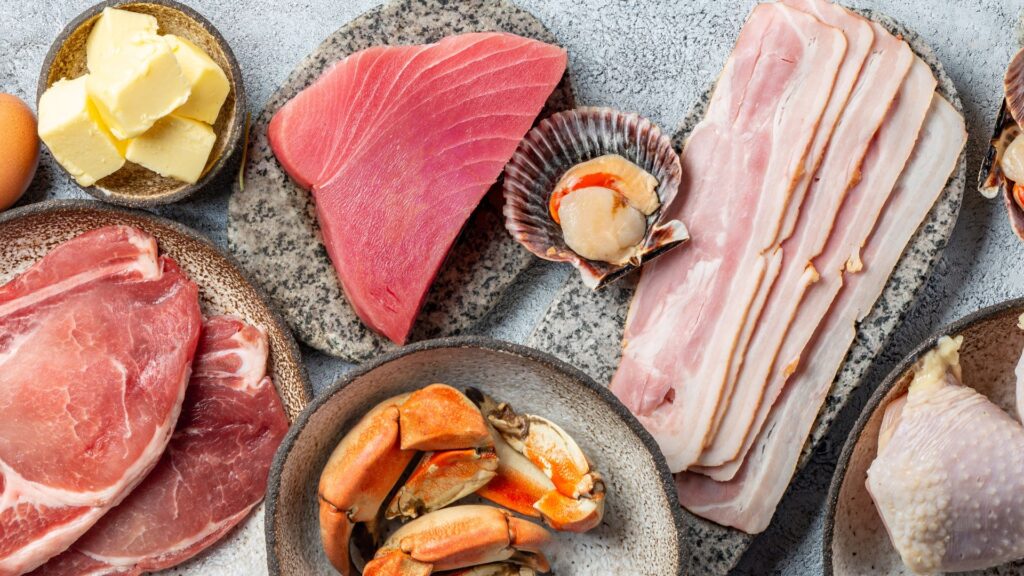
Here’s what you can have on the proper human diet:
- Meat: Your primary calorie source should come from fatty cuts of grass-fed beef like porterhouse, NY strip steak, ribeye, 80/20 ground beef, t-bone, bacon, flank steak, and pork chops. Because you’re restricting carbohydrates, meats with higher fat content are preferred so your body can use these fats as a source of energy.
- Eggs: More known as nature’s multivitamin or “super-food,” eggs are the perfect ratio of fats, protein, and essential nutrients to keep your body functioning at its best on the proper human diet.
- Fish: Just like meat, strive for the fattiest fish you can purchase. Sardines, salmon, trout, catfish, and mackerel are allowed.
- Simple spices, seasonings, herbs, and condiments: Salt, pepper, herbs, and spices are allowed in the Proper Human Diet. Stick to simple ingredients that don’t include any carbohydrates or sugar. If you want some flavor with your food, reconsider adding some zero-calorie hot sauce like Frank’s Red Hot.
- Bone marrow: Bone broth is PHD-approved and is an excellent protein source that helps gut, skin, and joint health.
- Grease, lard, and other animal-based fats: Use tallow, lard, and other animal-based fats to cook your food instead of unhealthy vegetable oil.
- Low-lactose dairy: Grass-fed butter and aged cheese are technically allowed since they come from an animal. However, many proper human dieters try to keep dairy intake at a minimum since a large percentage of the population has finally developed intolerance.
Foods to Avoid

Now for the hard part. Eating The Proper Human Diet is quite restrictive, so that means most of your everyday snacks and meals may be off the table: even fruits and most vegetables.
Here’s an example of sardines compared to some “healthy foods,” which will surprise you.
If you look at this, everyone thinks bananas and oranges are healthy for you. But when you take a closer look at these data, they actually are just a bunch of sugar and some tiny trace amounts of vitamins compared to proper human foods like sardines.
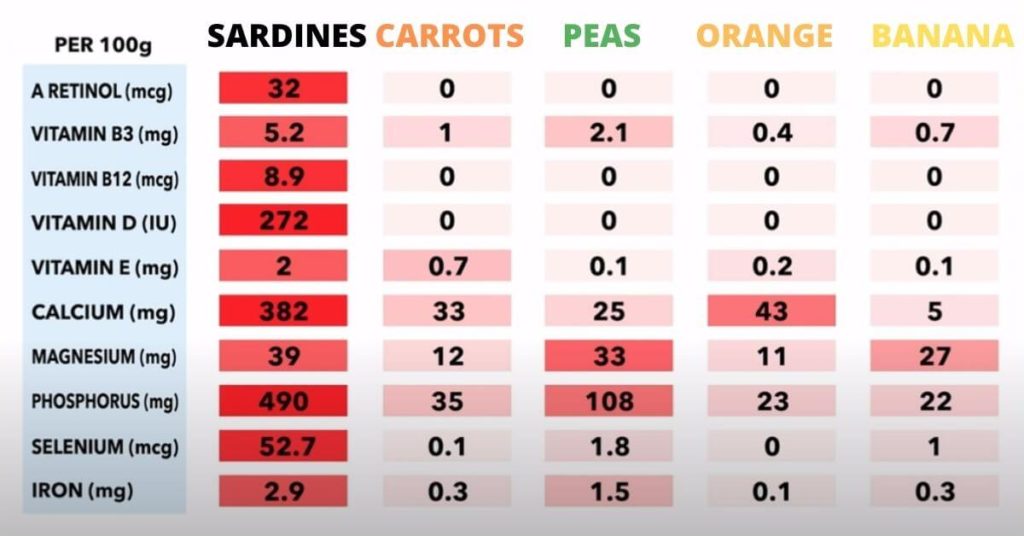
Here’s what you should reduce
- Vegetables: These include vegetable broths and any seasonings made from vegetables.
- Fruits: Bananas, apples, berries, tomatoes, you name it.
- Sugars: Added sugars are out the window! And that goes for natural sugars as well.
- Most dairy products: How much dairy you eat is up for discussion in the PHD community. However, people favor low-lactose dairy products such as aged cheeses and kefir instead of creamy cheeses and yogurt.
- Almost all nuts, seeds, and legumes: Most seeds, nuts, and legumes aren’t allowed either. And this includes peanuts, peas, flax seeds, chia seeds, etc.
- All bread, grains, pastries, etc.: No grains and bread across the board! And it means no rice, no pasta, etc.
- Anything else that isn’t meat! That involves lab-grown meats, candy-like taffy, and meat alternatives like Beyond burgers.
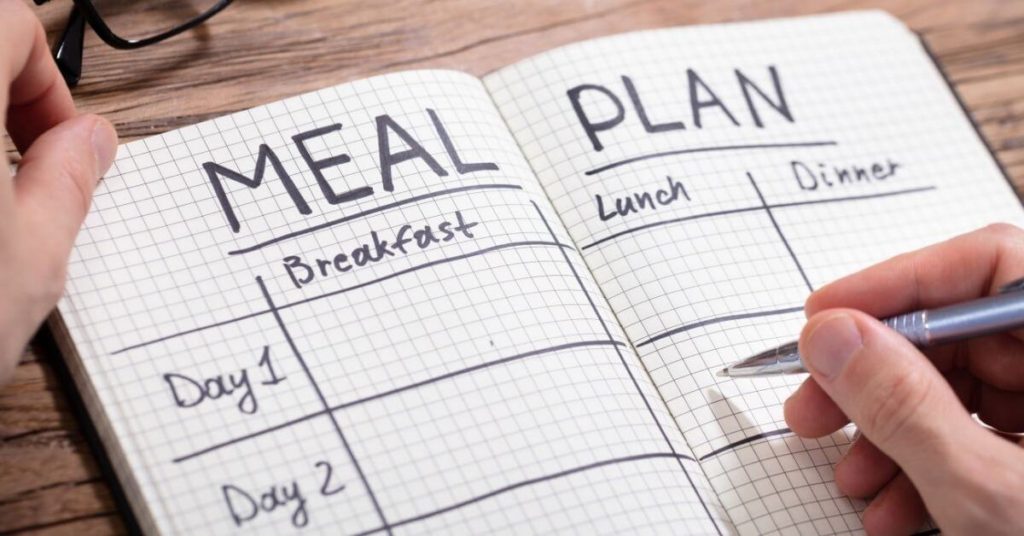
Proper Human Diet: Seven-Day Meal Plan
Getting started with the Proper Human Diet is extremely simple. Here’s an example of what a full week of eating on the PHD looks like.

Monday
- Breakfast: Steak and eggs
- Lunch: Fried pork and salmon
- Snack: Cottage cheese
- Dinner: Ground beef patties
Tuesday
- Breakfast: Feta cheese omelet
- Lunch: Chicken thighs with cheddar cheese
- Snack: Chomps!
- Dinner: Ribeye steak
Wednesday
- Breakfast: Kefir and two eggs over medium
- Lunch: Shredded chicken with bacon
- Snack: Tuna
- Dinner: Bison burgers
Thursday
- Breakfast: Poached eggs with bacon
- Lunch: Tuna and hard-boiled eggs
- Snack: Sardines
- Dinner: Bone broth and roasted chicken
Friday
- Breakfast: Chicken livers and scrambled eggs
- Lunch: Turkey burgers
- Snack: Hard-boiled eggs
- Dinner: Slow-roasted salmon
Saturday
- Breakfast: Bacon and eggs
- Lunch: Grilled chicken tenders
- Snack: Steak bites
- Dinner: Prime rib
Sunday
- Breakfast: Chicken and feta omelet
- Lunch: Beef liver
- Snack: Sardines
- Dinner: Pork chops
So, it doesn’t get more straightforward, and there’s no need to over-complicate it. In fact, if you love steak, you can eat it for breakfast, lunch, and even dinner!
Getting through the first month of the Proper Human Diet

Before diving into the Proper Human Diet, it’s essential to know the first month. The first week will be the hardest. Below are a few things you must understand to make the transition a little easier:
- First, get your blood tested.
Check your blood work before starting the Proper Human Diet and again after approximately two months.
Better yet, work with a physician! Everyone has different metabolic needs, so knowing if the diet works well with your body is essential.
- Expect your appetite to fluctuate.
You’ll have some days when you want to eat nonstop and other days when you won’t even think about food. Your cravings will adjust once your body gets used to the PHD diet.
- Don’t quit when you don’t feel right.
You’ll likely experience headaches, fatigue, and other flu-like symptoms during the first week of the PHD diet. It is a normal part of the process as your body uses fats for energy rather than carbs.
The risks
- Low Vitamin C
Eggs and organ meats like the liver are your only option apart from supplementation to get your Vitamin C.
Vitamin C is necessary for repairing our body’s tissues and helps reduce the chance of chronic diseases.
If you don’t like the taste of liver, here is a good supplementation: Ancestral Supplements Grass Fed Beef Liver.
- Lack of Fiber
Fiber is mainly found in plants, and it contributes to healthy bowel movements and good gut bacteria.
A lack of fiber may lead to constipation and ultimately contribute to an imbalanced gut, contributing to a weakened immune system.
- Loss of Good Bacteria
Many PHD evangelists note that intestinal issues are resolved after beginning a PHD diet.
It may be accurate due to eliminating typical inflammatory foods like lactose, sugar, or anything else your body may be sensitive to.
The problem is if good bacteria are eliminated over time, which could cause various digestion issues.
- Excessive Sodium and Saturated Fats
Eating mainly meat and dairy will almost surely increase your intake of sodium and saturated fats.
Excess sodium can cause headaches, kidney disease, swelling, and excess saturated fats, increasing your risk of a stroke.
13 Essential Principles for a Proper Human Diet in 2024
So, are you embarking on a journey toward optimal health and well-being in 2024? Your roadmap is a proper human diet, rich in nutrient-dense foods and free from inflammatory and processed items. Let’s once again dive into the essentials that make this diet a cornerstone of a healthy lifestyle.
Key Insights: Maximizing Nutrient Intake
- Harnessing Nutrient Power: Think of eating as a treasure hunt for nutrients. The goal? To consume the most nutrient-packed foods available. Take liver, for instance; it’s a powerhouse of nutrition often overshadowed by less nutrient-dense, but popularly labeled “healthy” foods.
- Flexible Carbohydrate Approach: Carbs aren’t the enemy, but they’re not the hero either. Imagine your carb intake as a volume knob, adjustable to your body’s needs. It’s all about finding that sweet spot where you feel best.
Protein and Fats: The Dynamic Duo
- Ancestral Eating for Modern Bodies: Embrace natural fats and proteins for hormone regulation and satiety. This approach helps in curbing the overconsumption of carbohydrates, a common pitfall in modern diets.
- The Fasting Window: Implement a 12-hour fasting ritual daily. Whether you choose to eat one, two, or three meals within this window, it’s a fantastic way to balance hunger hormones and prevent overeating.
The Core of Our Ancestral Diet
- Fatty Meats: A Historical Staple: Our ancestors thrived on fatty meats, and so can we. This ancient diet staple is making a comeback, proving its timeless value in our nutritional regimen.
Choosing Whole Foods
- One-Ingredient Wonders: The Golden Rule? If it’s a single-ingredient food, it’s likely a good choice. Processed foods, on the other hand, are a maze of hidden dangers.
Revisiting Traditional Diets
- Rediscovering Our Dietary Roots: Diets like keto, ketovore, low carb, and carnivore aren’t just trends. They’re a nod to our ancestral eating habits, focusing on high fat and protein with minimal carbs. This is in stark contrast to the high-carb diets often promoted, such as those recommended by the American Diabetes Association.
- Embracing a Meat-Centric Diet for Diabetes Management: Dr. Berry’s “Proper Human Diet” advocates for a diet rich in meat and low in carbohydrates to manage and potentially reverse type 2 diabetes. This approach focuses on high-protein, nutrient-dense foods that do not cause significant blood sugar spikes, thereby reducing the strain on the pancreas and insulin response. It marks a departure from traditional high-carb, low-fat dietary recommendations for diabetes management, suggesting that a meat-centric diet might be more effective.
- Strengthened Immunity and Digestive Health: The Proper Human Diet emphasizes nutrient-dense foods that bolster the immune system, not just avoiding illness but building a robust defense mechanism. Additionally, by eliminating processed foods and prioritizing natural, unprocessed options, the diet supports gut health. A healthy gut often leads to improved overall health, considering the diet’s potential impact on cholesterol management and even cancer treatment.
These principles reflect a paradigm shift towards a diet that aligns with our evolutionary dietary patterns and modern nutritional needs, with an emphasis on natural, unprocessed foods. Dr. Berry’s approach challenges traditional dietary norms and highlights the importance of a holistic approach to diet and health.
Remember, your diet is a personal journey. What works for one may not work for another. Stay curious, experiment, and listen to your body. It’s not just about what you eat, but how you eat it. Are you ready to embrace these principles and transform your health in 2024?
Frequently asked questions

Q: Can you build muscle on the Proper Human Diet?
PHD has to be combined with working out, of course. Many stories of muscle growth are a result of eating PHD. This is due to an increase in the average protein intake.
Q: Will “Proper Human Diet” work for athletes?
Absolutely, yes! Numerous fitness enthusiasts assume that glucose from carbs is the best source of quick and instant energy to fuel workouts and competition.
On this diet, your body will go through a process called gluconeogenesis, where some protein is converted into enough glucose for specific body functions.
Q: How long is the adaptation period?
Approximately one month. But if you’re like most people, you’ve been consuming carbohydrates your whole life. Therefore, your body might take some time to adjust to your new, healthier lifestyle.
Q: How much meat should I eat per day on a Proper Human Diet?
The PHD diet is not a calorie-counting diet. It is a Proper Human Diet designed to remove inflammatory foods and other ingredients introduced by modern nutrition.
You should eat until you’re full or until your calorie goal (if you have one) is reached. It’s finally up to you.
Q: Can I eat processed meats?
Yes, but you should aim for grass-fed animal products. Processed meats like pepperoni and other lunch meats typically contain unhealthy ingredients like artificial nitrates to preserve their shelf life, negatively affecting your health.
Q: Does the Proper Human Diet put you in ketosis?
While ketosis isn’t the explicit goal, it often occurs while following the PHD diet. It is because the proper human diet aims for zero carbs, so by design, your body will begin to prioritize burning fat over sugars and carbs.
Q: What are the basic concepts of the Proper Human Diet?
I contend that a proper human diet will lead to optimal health for humans and optimal health for you.
Go to this page for an updated version of the Proper Human Diet.
Medical Disclaimer
The content provided in this article is for informational purposes only and is not intended as medical advice or to replace professional medical guidance. Always seek the advice of your physician or other qualified health provider with any questions you may have regarding a medical condition or diet changes. The information on this diet is not verified or endorsed by medical professionals and is used at your own risk. We are not responsible for any health issues that may arise from following the diet outlined in this article.
